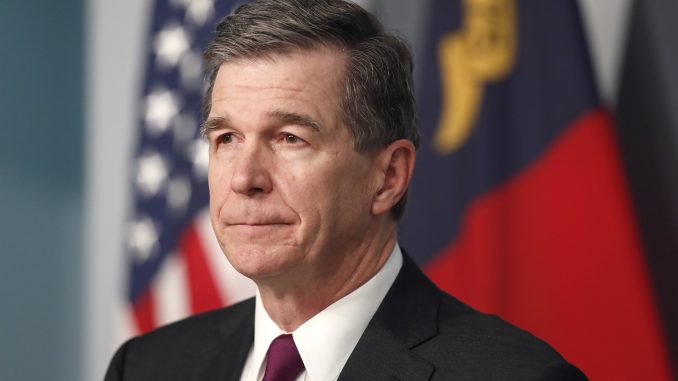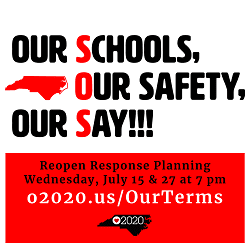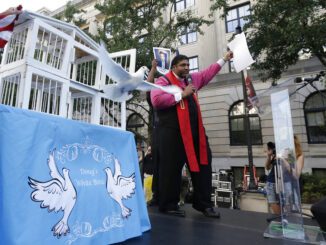
RALEIGH — Today during a COVID-19 media briefing, Gov. Roy Cooper finally announced a decision on the reopening of the state’s schools using “Plan B,” which is a hybrid of in-person attendance and remote learning.
“Today, we announce that North Carolina schools will open for both in-person and remote learning with key safety precautions to protect the health of our students, teachers, staff and families. This is the Plan B that we asked schools to prepare,” said Cooper.
“As a part of this plan, we want local school districts to provide a remote learning option for any child who chooses it. In addition, school districts will have the option of Plan C – all remote learning – if that’s best for them,” Cooper said, adding that all K-12 students and staff will be required to wear a mask.
“Face coverings will be required for every teacher, staff and student from kindergarten through high school,” said Cooper. The studies have shown overwhelmingly that face coverings reduce disease transmission.”
Up until this week, all guidance on masks in the state did not recommend masks for children under the age of 11.
Cooper also announced that Phase Two will continue after the expiration of the current order on July 17 and said that “North Carolina will continue to stay paused in Safer at Home Phase 2 for three weeks.” That puts a possible Phase Three transition on August 7.
Cooper was joined by Dept. of Health and Human Services Secretary Mandy Cohen and N.C. State Board of Education Chair Eric Davis.
“We all agree the best place for our students to learn and our teachers to teach is in our safe North Carolina Public Schools,” said Davis. He went on to emphasize safety by wearing a mask, washing hands and using social distancing.
According to “Lighting Our Way Forward,” the school reopening guide created by the N.C. State Board of Education and N.C. Dept. of Public Instruction, Plan B involves “moderate social distancing.” The guide has been characterized as a “living document” which can and likely will be changed over time.
Plan B reopens schools but institutes limitations on the density of attendance in facilities to no greater than 50% maximum occupancy. There are a number of options available within the state level Plan B that attempt to address issues of childcare for elementary and middle school levels. During the briefing, however, Cooper said the 50% isn’t required, but that schools must set capacity limits “to the extent necessary to ensure 6 feet distance can be maintained when students/staff will be stationary.”
Options for rotating schedules of on and off-campus learning using alternate days or alternate weeks are also included in the options for Plan B. Districts such as the Wake County Public School System have developed rotation schedules whereby students will be assigned to one of three groups which will rotate on a schedule of one week physically in school and two weeks of remote instruction. Wake County is also offering students a full-time “Virtual Academy” option, of which the district has indicated that 22,000 of the district’s over 161,000 students have enrolled as of July 14. Students have until July 20 to enroll in the Virtual Academy.
Cooper was supposed to announce the school reopening plan on a self-imposed deadline of July 1, however, he refused to make a decision that day, stating the decision would be coming “soon” and was likely “couple weeks away.”
At least three media outlets on July 1 asked Cooper what had changed that made him renege on his own deadline, but the closest Cooper came to answering was when he indicated he needed to get “a buy-in across the board” before making a definite decision. He did not specify what entities or groups were not on board, but later mentioned they wanted more input from parents and teachers.
Frustration and anxiety for parents and students alike was exacerbated by the delay in Cooper’s announcement. In an Elon poll released on July 2, the results showed no clear preference for reopening schools. The poll said that 38 percent preferred a hybrid approach, 34 percent were in favor of a full-time return to in-person instruction and 29 percent preferred that students continue remote learning.
“No demographic subgroup in our survey was in consensus about what K-12 schools should do in fall 2020,” Jason Husser, director of the Elon Poll and professor of political science and policy studies. “That all three broad approaches for reopening K-12 schools have similar levels of support is a testament to the uncertainty, complexity and difficulty of the decision.”
In a statement before Cooper’s announcement, Sen. Deanna Ballard (R-Watauga) said that “Educators have always told us about the learning loss students experience when they’re not in the classroom.”
“Kids from well-off households with two parents may be in a better position to succeed away from the classroom. But it’s the impact on the child of a single mother who works an hourly job that concerns me the most,” said Ballard. “We can and must get our students back into classrooms while providing an alternative for those most vulnerable to the virus.”
To date, the General Assembly has authorized $600 million for K-12 education and almost $400 million in federal CARES Act money. The lion’s share of spending, $75 million has gone towards meals. Another $70 million to summer learning programs, $56 million was issued for internet connectivity, broadband and devices to access online learning. Spending also included $7 million for Personal Protective Equipment (PPE).
For several weeks, President Donald Trump has urged for schools to reopen and he’s not the only one. The American Academy of Pediatrics (AAP) has also called for reopening. AAP is a membership organization made up of 67,000 pediatricians. The AAP’s guidance for school re-entry “strongly advocates that all policy considerations for the coming school year should start with a goal of having students physically present in school.”
In a recent interview, CDC Director Robert Redfield said that “having the schools actually closed is a greater public health threat to the children than having the schools reopen.”
Pushback on reopening schools has come from the nation’s largest teacher’s union, the National Education Association (NEA). Both the NEA and the American Federation of Teachers are demanding on some level more money be spent before schools are reopened. In a joint statement with the NEA, the AAP said that safety should be maximized and that ” A one-size-fits-all approach is not appropriate for return to school decisions.”
“None of us should accept the false choice,” NEA President Lily Eskelsen García said in a statement on the organization’s website. “There are ways to mitigate the risk. It will be costly but it’s worth every dime. We will not open an unsafe school. Nothing else is acceptable.”
In North Carolina, pushback has come from the N.C. Association of Educators (NCAE), an NEA affiliate, which has been active in their political support of Democrats in the state, and in particular, supporters of the governor. The NCAE has held multiple virtual meetings discussing how to push back on school reopening plans and keep schools working mainly remotely in August.
Organize 2020, the NCAE’s racial and social justice caucus, has played an active role in organizing dissent for reopening. By using their collection of closed groups on Facebook, such as the NC Teachers United page, Organize 2020 has been taking the temperature of members on striking to show opposition to reopening.
 In an email sent earlier this month, titled “We won’t go back: Responding to School Reopening,” the NCAE and Organize 2020 state that “By acting together, we have the power to determine the conditions in which we will return to in-person instruction.”
In an email sent earlier this month, titled “We won’t go back: Responding to School Reopening,” the NCAE and Organize 2020 state that “By acting together, we have the power to determine the conditions in which we will return to in-person instruction.”
The email goes on to say that “As frontline workers and families who know how best to meet our children’s educational needs, we have the responsibility to ensure we do so safely.”
The email was accompanied by graphics with slogans, one of which reads, “Our schools, Our Safety, Our Say!”



